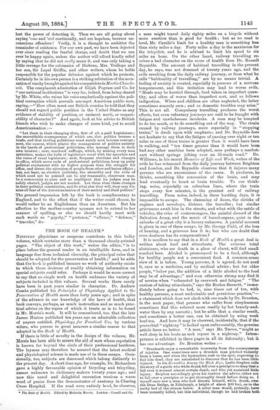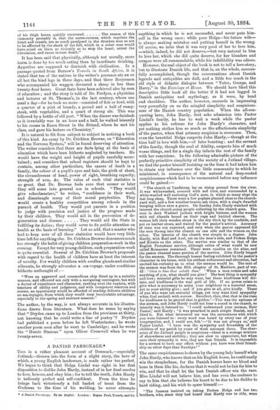THE BOOK OF HEALTH.* NINETEEN physicians or surgeons contribute to
this bulky volume, which contains more than a thousand closely-printed pages. " The object of this work," writes the editor, " is to place before the general reader in an intelligible form, and in language free from technical obscurity, the principal rules that should he adopted for the preservation of health ;" and he adds that the book is published because no work- of authority exists to which those desirous of readily obtaining information on special subjects could refer. Perhaps it would be more correct to say that no single work on health embraces the variety of subjects included in this volume. Several works there surely have been in past years similar in character. Dr. Andrew Combe published his Principles of Physiology Applied to the Preservation of Health more than forty years ago ; and in spite of the adirance in our knowledge of the laws of health, that book conveys, perhaps, as much instruction and as much prac- tical advice on the topics of which it treats as is to be found in Mr. Morris's work. It will be remembered, too, that the late James Hinton published ten years ago an admirable collection of papers entitled, Physiology for Practical Use, by various -witers, who pursue in great measure a similar coarse to that adopted in the Book of Health.
If there is little of novelty in the design of the volume, Mr. Morris has been able to secure the aid of men whose reputation is known far beyond the circle of their professional brethren. The layman may therefore be assured that the latest medical and physiological science is made use of in these essays. Occa- sionally, too, subjects are discussed which belong distinctly to the present day. A short time ago, for example, Dr. Richardson gave a highly favourable opinion of bicycling and tricycling, names unknown to dictionary-makers twenty years ago ; and now this novel and delightful recreation receives a warm word of praise from the demonstrator of anatomy in Charing Cross Hospital If the road were entirely level, he observes, • The Book of Health. Edited by Malcolm Morris. London : Cassell and Co.
a man might travel daily eighty miles on a bicycle without more exertion than is good for health ; but as no road. is level, Mr. Candle's limit for a healthy man is something less than sixty miles a day. Forty miles a day is the maximum for
the tricyclist, and he is advised to limit his speed to six miles an hour. On the other hand, railway travelling re- ceives a bad character on the score of health from Dr. Russell.
Reynolds. The amount of habitual travelling in the present day, he says, was not dreamed of twenty years ago, and the evils resulting from the daily railway journey, or from what he calls "habituality of travelling," are by no means trivial. A feeling of anxiety is created, especially in persons of a nervous temperament, and this irritation may lead to worse evils. "Meals may be hurried through, food taken in imperfect quan- tity, and often of worse than imperfect sort, and so follows indigestion. Wives and children are often neglected, the latter sometimes scarcely seen ; and so domestic troubles may arise." This is not all. Compulsory travelling produces the worst effects, but even voluntary journeys are said to be fraught with fatigue and unwholesome incidents. A man may be tempted to do too much, or to do something out of the way. The strain caused by railway journeys, more especially in "stopping trains," is dwelt upon with emphasis ; and Dr. Reynolds does not hesitate to say that the fatigue of passing over eight or ten miles in one of these trains is greater than it would have been in walking, and "ten times greater than it would have been had any other machine been adopted, save perhaps a market- cart without springs jolting over an ill-made road." Dr.
Williams, in his recent Memoirs of Life and Work, writes of the evils he has witnessed from the daily journey between Brighton
and London, and Dr. Reynolds observes that it injures many persons who are unconscious of the cause. It produces, he thinks, something like concussion of the brain, and may lead eventually to heart or brain trouble. To our think- ing, noise, especially on suburban lines, where the train stops every few minutes, is the greatest evil of railway travelling. From noise, indeed, in these bustling days, it is impossible to escape. The slamming of doors, the shrieks of engines and newsboys, distress the traveller ; but similar grievances await him in the streets, and what with the rattle of vehicles, the cries of costermongers, the painful discord of the Salvation Army, and the music of barrel-organs, quiet in the suburbs of a great city is a luxury unknown. A painful account is given in one of these essays, by Mr. George Field, of the loss of hearing, and a grievous loss it is ; but who can doubt that even deafness has its compensations ?
It is needless to say that in a Book of Health a great deal is written about food and stimulants. The extreme total abstainers, who see death in a glass of claret, will find small comfort here. Alcohol is pronounced to be a food, although for healthy people not a convenient food. A common-sense view of it is taken. Young persons, it is agreed, do not need it, save as a medicine, and by medical advice ; bat for older people, "below par, the addition of a little alcohol to the food may be of advantage ;" and men otherwise strong may find it of service when " exhausted by overwork and fatigue." " The custom of taking stimulants," says Sir Risdon Bennett, " imme- diately before going to bed, is, nine times out of ten, with healthy persons, a most undesirable and pernicious practice,"— a statement which does not clash with one made by Dr. Brunton, in the next paper, that persons who suffer from sleeplessness sometimes find this relieved more readily by hot brandy-and- water than by any narcotic; but he adds that a similar result, and sometimes a better one, can be obtained by using weak beef-tea. And here it may be observed, incidentally, that if the
proverbial " nightcap " is looked upon unfavourably, the genuine article fares no better. "A man," says Mr. Treves, "might as well sleep in his boots-as seek repose in a nightcap." Intem- perance is exhibited in these pages in all its deformity ; but it has one advantage. Dr. Brunton writes :— " Drunkards enjoy a remarkable immunity from the consequence's of injuries. One sometimes sees a drunken man pitched violently from a horse, and when the bystanders rush to the spot, expecting to find him dead, they are astonished to discover that he has been little injured. In his Scrambles Among the High Alps, Leslie Stephen tells the story of a guide who while drunk fell over a precipice so deep that a fall over it seemed almost certain death, and who yet sustained little injury. Stephen accordingly gives his readers the advice either not to fall over a precipice or to get thoroughly drunk before doing so. I myself once saw a man who had thrown himself, while drunk, over the Dean Bridge, in Edinburgh, a height of about 200 feet, on to the rocky bed of the stream below. A sober man would, probably, have been instantly killed, but this individual, though he had broken both
Of his thigh bones, quickly recovered The reason of this immunity probably is, that the nerve-centres, which regulate the heart and vessels, are so much paralysed in the drunken man as not to be affected by the shock of the fall, which in a sober man would have acted on them so violently as to stop the heart, arrest the circulation, and cause instant death."
It has been said that physically, although not morally, more harm is done by too much eating than by inordinate drinking.
Appetites are supposed to diminish with civilisation. In a passage quoted from Barrow's Travels in South Africa, it is stated that ten of the natives in the writer's presence ate an ox all but the hind legs in three days, and that three Bosjesmen who accompanied his waggon devoured a sheep in less than twenty-four hours. Great feats have been achieved also by men of education ; and the story is told of Dr. Fordyce, a physician and lecturer at St. Thomas's, in the last century, whose one meal a day—for he took no more—consisted of fish or fowl, with a quarter of a pint of brandy, a pound and a half of rump- steak, with vegetables, and a quart of strong ale. This was followed by a bottle of old port. "When the dinner was finished, as it invariably was in an hour and a half, he walked leisurely to his rooms in Essex Street in the Strand, where he met his class, and gave his lecture on Chemistry."
It is natural to flit from subject to subject in noticing a book of this kind. An essay by Dr. Crichton Browne, on "Education and the Nervous System," will be found deserving of attention. The writer considers that there are facts lying at the basis of education which have been hitherto neglected by teachers. He would have the weight and height of pupils carefully ascer- tained ; and considers that school registers should be kept to -contain, among other particulars, the causes of death in a family, the colour of a pupil's eyes and hair, the girth of chest, the circumference of head, power of sight, breathing capacity, strength of arm, &c. The value of such vital statistics is so great, that Dr. Browne feels sure that sooner or later they will come into general use in schools. "They would give schoolmasters," he writes, " confidence in their work, and disentangle many of their moral perplexities. They would create a healthy competition among schools in the pursuit of health. They would put parents in a position to judge with precision and justice of the progress made by their children. They would aid in the prevention of de- generation and disease They would aid the State in fulfilling its duties ; they would serve to fix public attention on health as the basis of learning." Let us add, that a master who had to keep note of all these statistics would have very little time left fin. anything else. Dr. Crichton Browne denounces much too strongly the habit of giving children preparation-work in the evening. Except for very young children, such preparation-work is quite essential. Several of Dr. Crichton Browne's proposals with regard to the health of children have at least the interest of novelty. For weakly children with swollen glands and similar ailments, he strongly advocates a sea-voyage, under conditions hitherto nnthought of :-
"Were an approved and commodious ship fitted tip in a suitable manner, and officered not only with a navigating contingent, but with a doctor of experience and character, ranking next the captain, with -teachers of ability and judgment, and with competent matrons and nurses, an opportunity would be afforded of sending delicate children on sea-voyages, from which they would reap incalculable advantage, especially in the spring and summer seasons."
The author, by the way, is not always accurate in his illustra- tions drawn from literature. What does he mean by saying that " Dryden came up to London from the provinces at thirty, not knowing that he could write a line of poetry "P Dryden had published a poem before he left Westminster; he wrote another poem soon after he went to Cambridge ; and he wrote the " Heroic Stanzas " upon Oliver Cromwell when he was twenty-seven.



































 Previous page
Previous page